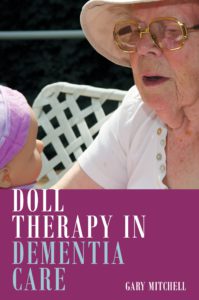
We caught up with Gary Mitchell on the publication of his important new resource for dementia care professionals – Doll Therapy in Dementia Care.
What motivated you to write the book – Doll Therapy in Dementia Care?
I qualified as a nurse in 2010 and my first post was in a dementia care unit in Northern Ireland. When I began working on the unit I quickly saw the benefits of person-centred care and non-pharmacological interventions. One particular intervention that was regularly taking place on the unit was ‘doll therapy’. Initially it was an intervention that I wholeheartedly rejected because I felt it perpetuated stigma that can be associated with dementia. I felt like playing with dolls would undermine the person-hood of the individuals living with dementia I was nursing. After some time I began to see some very positive outcomes in some of our residents’ quality of life who engaged with doll therapy. On reviewing the evidence in 2010, I found that there wasn’t really that much out there. Over the past number of years I have closely studied doll therapy in dementia care through my practice and academia. My opinions on doll therapy, informed by evidence and practice, are starkly different. In short, doll therapy can enhance the quality of life for some people who live with dementia. This was the sole reason for writing this book – to share the evidence and practice about doll therapy so as people living with dementia who will benefit from it can be enabled to do so.
Although used widely, doll therapy has been considered a controversial intervention – why do you think that it?
Doll therapy has been considered as means of actively infantilizing people living with dementia. It is a poorly understood intervention and I believe that this book will assist in dispelling a lot of the myths associated with the therapy.
What are you hoping readers will take away from the book?
I hope readers will be able to better understand doll therapy and how it can be used in dementia care to make a positive difference. It is an intervention which can form an important part of person-centred care for some people living with dementia. Quite simply, I hope that people who read the book will place the person living with dementia at the centre of decisions about doll therapy – if there are potential therapeutic benefits for that person then surely these are worth exploring.
Your current role involves the development, implementation and evaluation of best practices in dementia care throughout a number of care homes in the UK. What made you choose a career in dementia care?
I have worked in care homes since I was 17 years old with Four Seasons Health Care. Truthfully, I expected to work within acute care when I qualified as a nurse – but this has not been the case. The reason is related to two main factors. One is my passion for specialising in the care of older people and dementia, the other has been the continued support and development of my practice by Four Seasons Health Care. I enjoy visiting care homes throughout the UK and assisting practitioners to deliver best practice.
Follow Gary on Twitter: @GaryMitchellRN
To find out more information or buy a copy of the book, please click here.